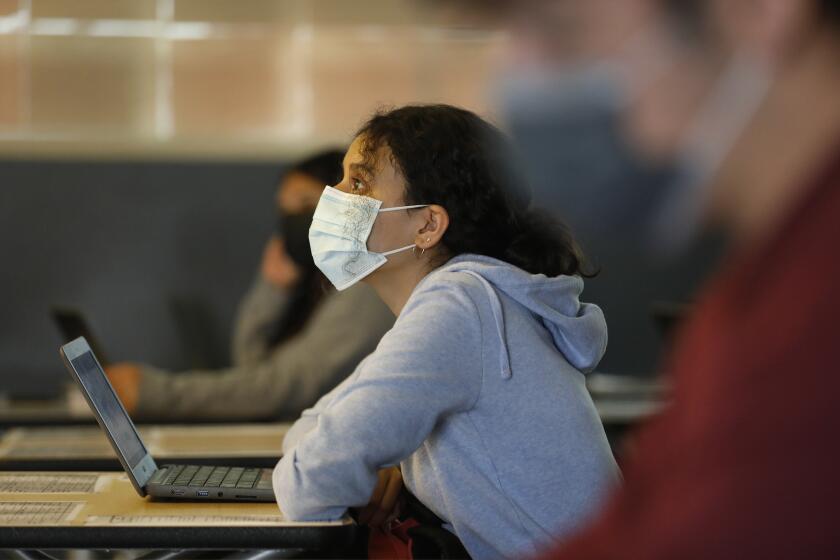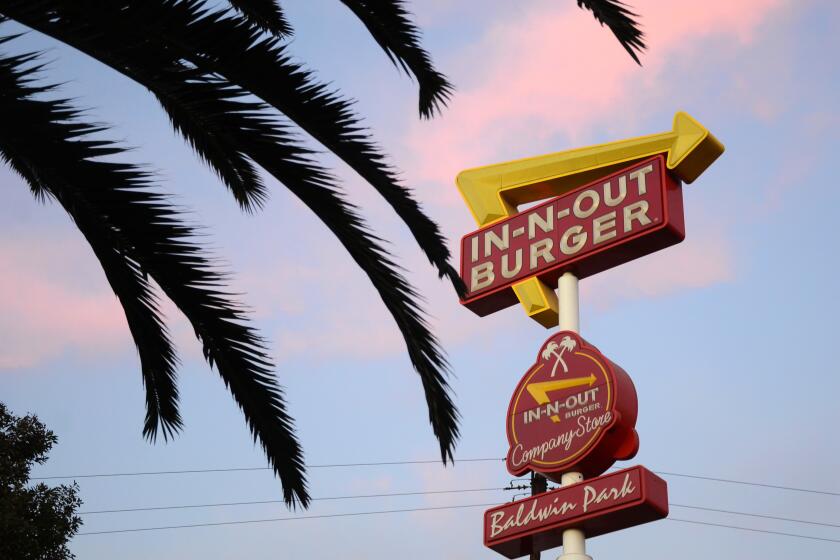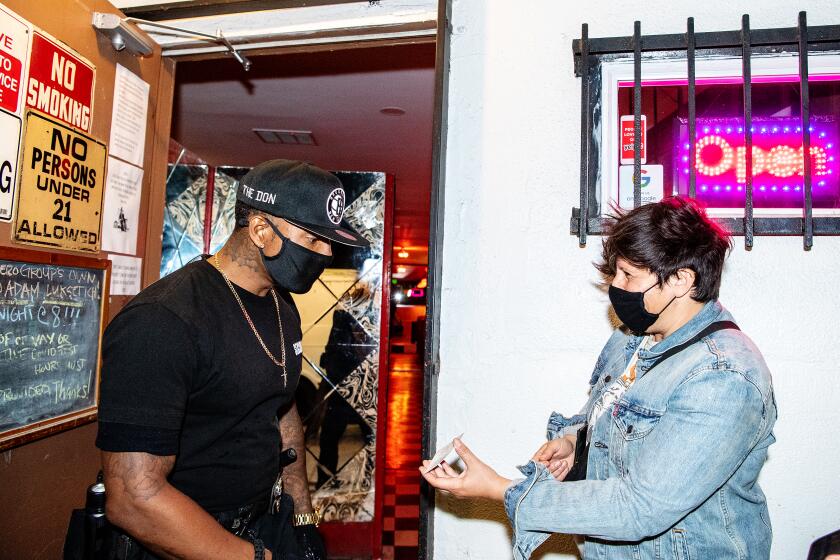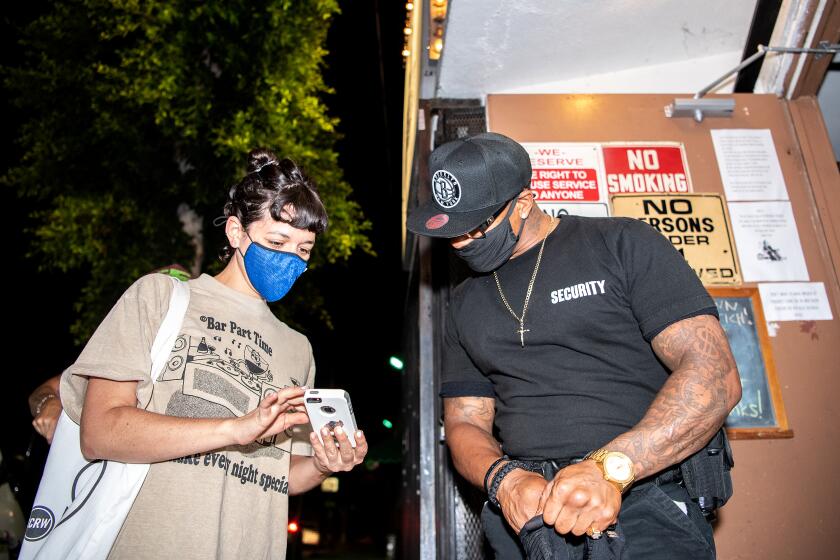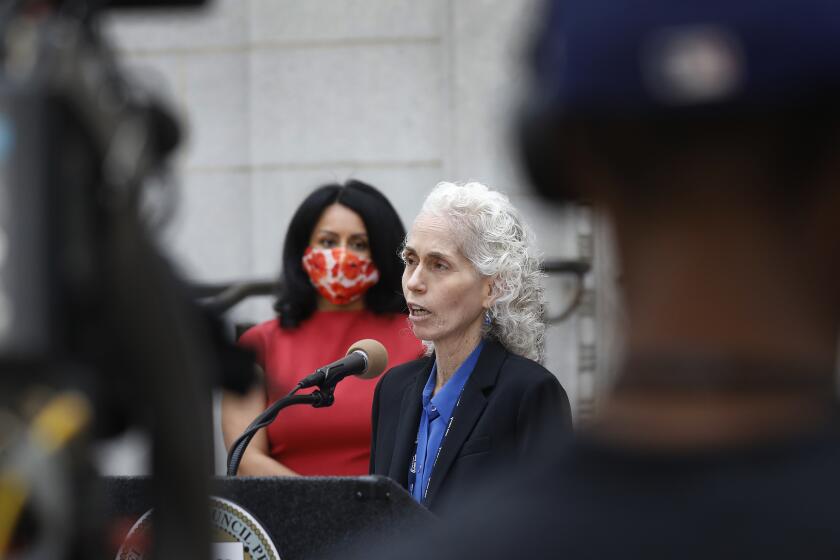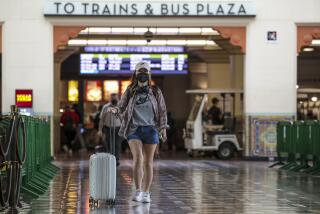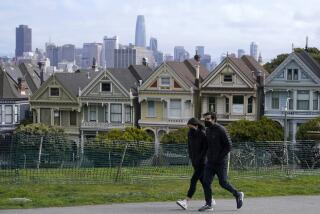In-N-Out calls California vaccine mandate ‘offensive.’ Will others join battle?
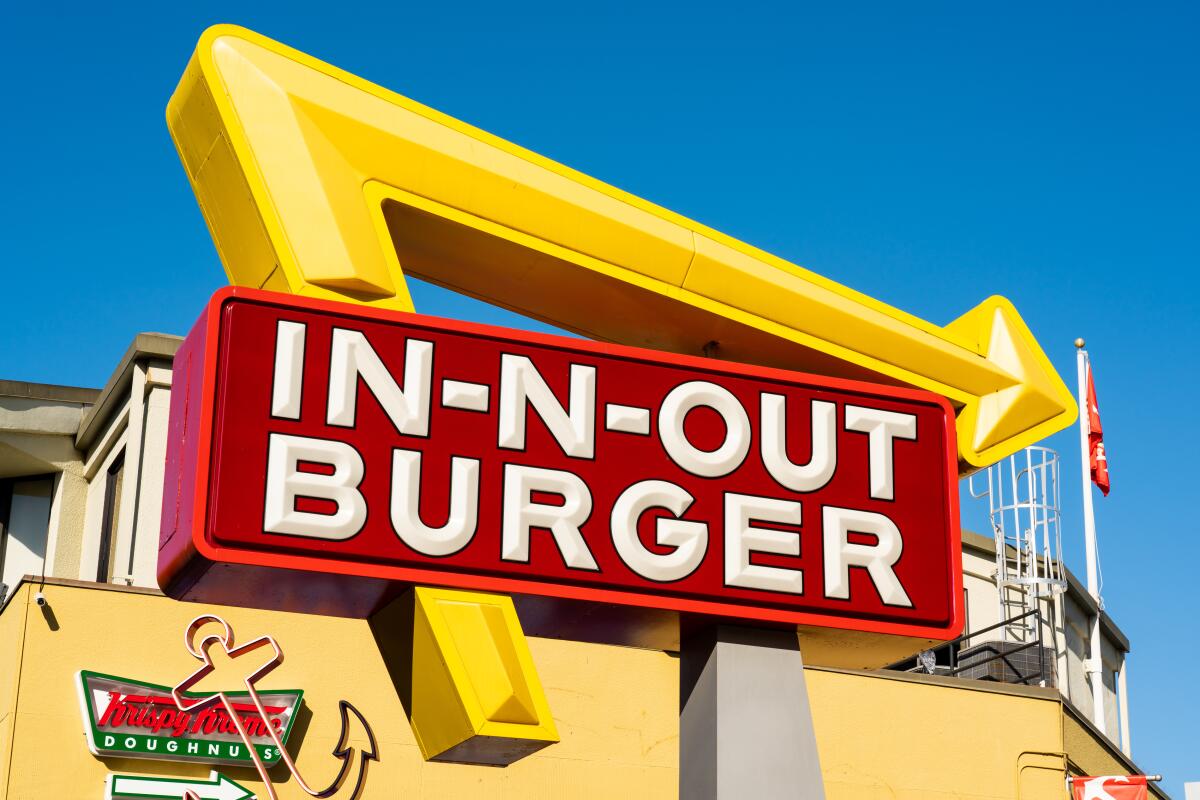
- Share via
SAN FRANCISCO — For a short time earlier this month, an In-N-Out at San Francisco’s famed Fisherman’s Wharf refused to add a new item to its iconic menu.
The city had ordered the burger spot, and all other local restaurants, to screen patrons’ COVID-19 vaccination status before allowing them to dine indoors. When inspectors found In-N-Out wasn’t doing that, they temporarily closed the location.
The fast-food chain publicly decried the action but took steps to reopen just a few days later.
But as more communities across California require proof of vaccination for many retailers and other public venues, the battle over enforcement of the new rules is just beginning to heat up. Next month, the city of Los Angeles will require that eateries, shopping malls and many other indoor venues check customers’ vaccination status.
Such mandates aim to slow the spread of COVID-19 both by reducing potential exposure and encouraging more people to get vaccinated. But they also place an additional burden on businesses and leave government officials grappling with how to deal with scofflaws.
Many businesses have welcomed these sorts of rules, saying it gives them government backing to do what they think is safe. But that’s far from a universal view.
As more California cities require proof of COVID-19 vaccinations in public places, a cherished burger chain has become an unlikely flashpoint.
As Arnie Wensinger, In-N-Out’s chief legal and business officer, put it: “We refuse to become the vaccination police for any government.”
“We fiercely disagree with any government dictate that forces a private company to discriminate against customers who choose to patronize their business,” he said in a statement. “This is clear governmental overreach and is intrusive, improper and offensive.”
The San Francisco Department of Public Health, meanwhile, stands by its enforcement actions.
“Vaccines remain our best tool to fight this disease and come out of the pandemic,” department officials said in a statement. “Vaccination is particularly important in a public indoor setting where groups of people are gathering and removing their masks, factors that make it easier for the virus to spread. That is why San Francisco requires proof of vaccination for indoor dining.”
The standoff came to a head Oct. 14, when, according to Wensinger, Department of Public Health representatives closed the chain’s location at 333 Jefferson St.
Health officials told employees they were being shut down because they weren’t stopping customers who didn’t have proper vaccination documentation from coming inside, Wensinger said.
Officials say it’s possible to safely participate in many holiday activities if everyone is vaccinated for COVID. But extra precautions may be needed.
In a statement to The Times, the health department said it issued a “final notice of violation and a notice of closure” to the location for failing to comply with the city’s public health order.
“Since the notice of closure was issued, the business has taken steps to comply and has since resumed operations for outdoor dining and take-out only,” the statement continued.
Wensinger said that the location “properly and clearly” posted signs telling patrons about the local vaccine requirements but that public health officials told employees they had to “actively intervene” and demand proof of vaccine and photo identification from every customer.
He called San Francisco’s mandate unreasonable, invasive and unsafe for employees to “segregate customers” into groups of who can and can’t be served.
The restaurant posted signs about vaccine requirements, but city officials said employees should demand proof of vaccination from customers, the company said.
According to public health officials, In-N-Out Burger representatives were warned multiple times about the requirement, including during a Sept. 24 visit after a complaint to the city’s 311 line. Inspectors followed up on Oct. 6 and found the Fisherman’s Wharf location was still not complying.
“Since then, public health inspectors had attempted multiple times to bring the business into compliance with the health order,” officials said. “In-N-Out Burger had not complied by the time the final notice of violation and a notice of closure was issued.”
At this point, the situation at In-N-Out appears to be an isolated example. San Francisco hasn’t issued any other formal notices of violation or ordered any other closures related to its vaccine-verification requirement.
Officials said their approach has centered on education and outreach, and “the vast majority of businesses have worked in partnership with the city to protect public health, understanding that the health and safety of our community remains our highest priority and our reopening is contingent on us getting the virus under control.”
Of the 151 San Francisco food-service businesses that responded to a survey the Golden Gate Restaurant Assn. conducted in early to mid-September, about 79% said they’d had “very few issues with customers being willing and able to show proof of vaccination to sit inside.”
“Does it put a burden on you? Do you have to add a little more staffing? Does it put people potentially in conflict? Unfortunately, it does,” said Laurie Thomas, the group’s executive director. “But, really, it has been much less of a problem than anybody anticipated.”
Thomas said Wednesday that many establishments welcomed the consistency of rules set by the city, as having different requirements from place to place not only would confuse customers but would “put an unfair burden on the businesses that are trying to do the right thing.”
This particular In-N-Out, she added, “knew what the consequence was, and they wanted it played to that point.”
“And look at what’s happened,” she said. “Look at all the press they’ve gotten.”
Around L.A., some businesses are asking for proof of vaccination against COVID-19 to enter. Here’s what you need to know about vaccination records.
Nearby Contra Costa County, which includes East Bay cities such as Richmond and Walnut Creek, passed similarly stringent rules requiring indoor diners to show either proof of COVID-19 vaccination or a recent negative coronavirus test.
Since its health order went into effect Sept. 22, the county has received 95 public complaints alleging violations at restaurants, bars and other commercial food facilities. Officials have issued four notices of violation and assessed five fines totaling $1,750, according to spokesman Karl Fischer.
Two of those fines — a combined $750 — were issued at an In-N-Out location in Pleasant Hill over the last week, Fischer said. However, no businesses have been forced to close.
“The primary goal of health order enforcement is to educate businesses and residents about how to keep themselves and the community safe from COVID-19,” Fischer wrote in an email Wednesday.
The vaccine verification requirement went into effect at 11:59 p.m. Thursday.
Los Angeles County is also taking an education-focused approach to administering its own — more limited — vaccine-verification requirement.
From Oct. 8 through Sunday, county health inspectors visited 262 indoor bars, wineries, breweries, distilleries, nightclubs and lounges that are subject to its new mandate. Inspectors noted 38 businesses that needed additional training on customer vaccine verification, but they have yet to issue any citations.
Health officials have regularly said requiring vaccine documentation for business patrons or employees is an effective tool — not only because such orders can help keep unvaccinated individuals from mingling in higher-risk settings, but because they might push more people to finally roll up their sleeves.
“The hope is that, by adding in extra protections, we avoid a winter surge that forces us to take steps backward on our recovery journey,” L.A. County Public Health Director Barbara Ferrer said during a recent briefing.
Visits to businesses by L.A. County health inspectors Oct. 8-10 were focused primarily on education rather than heavy-handed enforcement.
But the state Department of Public Health has not issued any such mandates.
“We encourage all Californians to get vaccinated to protect themselves from COVID-19 and help end the pandemic, and urge businesses to follow the state’s lead in requiring vaccination for employees,” officials said in response to an inquiry from The Times. “However, the state has not provided guidance for small businesses related to vaccine requirements or exemptions.”
People who oppose employee vaccine mandates tend to get a lot of attention publicly, but the implementation of the policies doesn’t suggest there’s a huge problem, according to Dr. Ashish Jha, dean of the Brown University School of Public Health.
“They are working. My conclusion looking at the data is there’s a noisy minority of, in most industries, 1%, 2%, who are not going to take it. They’ll lose their job, but they won’t get vaccinated. And it’s not enough to really cause serious problems in almost any industry or business,” Jha said at a recent UC San Francisco forum.
New York City officials say their requirement to show proof of vaccination for indoor dining, gyms, movie theaters and other public spaces has been successful.
Mayor Bill de Blasio said last week the city’s businesses have done a good job enforcing the mandate. Among 31,000 inspections citywide, only 15 violations have been issued, the mayor told reporters in a briefing.
“This is exactly what we hope to see and what we believed we’d see: the vast majority of businesses working to keep everyone safe, their employees, their customers,” de Blasio said.
He also credited the requirements with an increased rate of vaccination among younger adults.
“Young people —of course, they want to go out to restaurants and bars and entertainment. It makes sense,” de Blasio said. “We know all the tools, the incentives, the mandates. All the tools together work.”
Lin reported from San Francisco and Yee and Money from Los Angeles.
More to Read
Sign up for Essential California
The most important California stories and recommendations in your inbox every morning.
You may occasionally receive promotional content from the Los Angeles Times.

